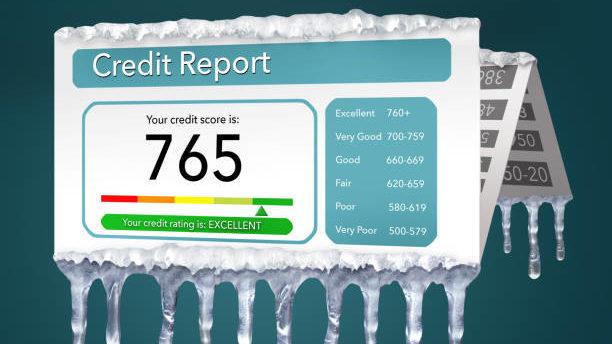Worried that a hacker will steal your personal information and use it to apply for credit cards, a home equity line of credit (HELOC) or personal loans in your name? Then it might be time to freeze your credit, something you can do free with the three national credit bureaus of Experian, Equifax and TransUnion.
Mike Pearson, New York City-based credit expert and founder of the blog Credit Takeoff, says that credit freezes are an especially smart move if you suspect that someone has already stolen such personal information as your Social Security number or bank account or credit card information.

Ordering these freezes could prevent a financial headache, he said.
"Freezing your credit means that nobody will be able to open credit accounts in your name," Pearson said. "This is a huge pro that prevents identity thieves from getting access to your credit score and charging things on your dime."
Not a cure-all
But be aware that while freezing your credit will prevent you from one specific type of identity theft, it won’t prevent thieves from making fraudulent purchases on your credit cards or draining the funds from your bank account.
Freezing your credit, then, is a smart move, but don’t think it completely protects you from identity theft.
What a freeze does
When you freeze your credit, it prevents financial institutions such as mortgage lenders, banks and credit card providers from accessing the credit reports maintained by Equifax, Experian and TransUnion. Because of this, these financial services providers can’t approve loans or credit card applications for you.
This prevents hackers from using stolen personal information such as your Social Security number to open credit cards or loans in your name. If they try, lenders and banks will reject the applications they send in because your credit is frozen.
"If your credit file is frozen, the bad guys can't access it any longer," said Boston-based Robert Siciliano, a security awareness expert and chief executive officer of Safr.Me. "With a credit freeze, your credit file is inaccessible."
This offers important protection. But there is a limit: Freezing your credit doesn’t prevent hackers from stealing information about your current credit card accounts, for instance. If they get this information, they can use it to run up purchases on your account. Credit freezes don’t stop criminals from stealing your bank account information, either, and then siphoning off the money in this account.
The lesson here? Even if you do freeze your credit, you still need to monitor your credit reports, bank accounts and credit card statements to make sure no one has gained access to them.
Even though a freeze won't protect you from all types of identity theft, Siciliano still recommends that you order them at all three credit bureaus.
"If you are a person who has had their identity stolen, you should freeze your credit," Siciliano said. "If you have a Social Security number, you are a target. If you breathe, you are a potential victim. Make your Social Security number useless to the thief by freezing your credit."
How to freeze your credit
You won’t have to pay to freeze your credit, thanks to a federal law that went into effect in 2018. Robert Farrington, the El Cajon, California-based founder of TheCollegeInvestor, said that because of this, there is now no downside to freezing your credit.
There is one big misconception people might have about freezes, though, Farrington said. To truly freeze your credit, you must order freezes at all three credit bureaus, Farrington said. If you only order a freeze with TransUnion, hackers might still be able to use your credit to create accounts in your name.
"Freezing your credit at just one bureau is not an effective way to freeze your credit," Farrington said.
The easiest way to freeze your credit is to do it online. Each of the credit bureaus has a web page dedicated to letting you freeze your credit. You can order your online freezes by phone, calling Equifax at 1-800-685-1111, TransUnion at 1-888-909-8872 and Experian at 1-888-397-3742, or online through the individual web sites of three agencies.
After you freeze your credit, each bureau will send you a PIN. You’ll need this number to unfreeze your credit in the future, so don’t lose it.
While your credit is frozen, you won’t be able to apply for new credit cards or loans. You’ll need to unfreeze your credit at each of the bureaus, using the PINs they sent you, to free up your credit again. You can always re-freeze your credit after your loan or credit card has been approved.
Protect yourself
Even after you freeze your credit, make sure to protect your financial information.
Your best move is to order copies of all three of your credit reports from AnnualCreditReport.com. You can order one report each from Equifax, Experian and TransUnion every year at no charge. This means you can check your credit reports three times without a charge.
Once you order a report, check it over carefully. Make sure you don’t notice any loans or credit cards listed on the report that you don’t remember taking out. If you do, that could be the sign of identity theft.
Check your credit card statements carefully, too. Look for transactions that you don’t remember making. These could be the work of hackers who stole your information and accessed your credit card account.





